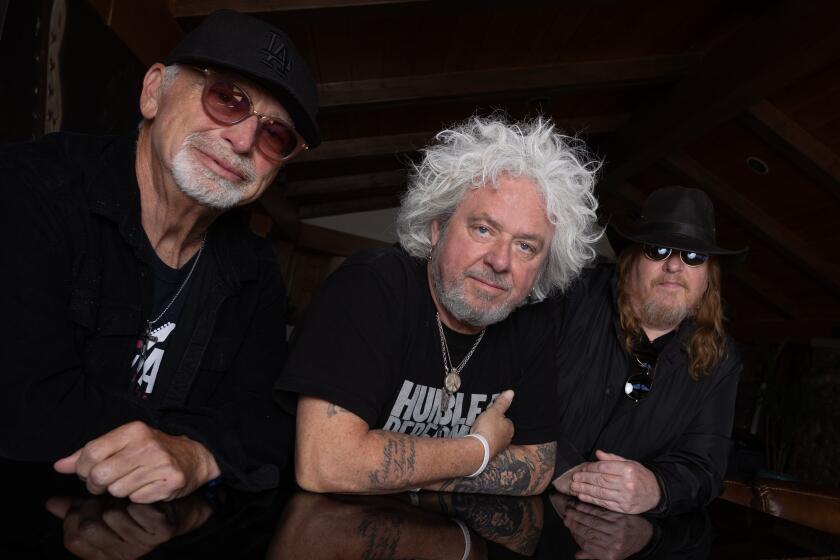POP MUSIC REVIEW : BROWNE ON THE BOULEVARDS
In one of the few songs from early in his career that Jackson Browne revived Wednesday at the Universal Amphitheatre, he sang about “thinking about Everyman.” Ironic, given that back in those early albums his songs were almost wholly self-absorbed. Nowadays, he really does seem to be concerned about every man .
Browne is no longer the post-hippie figure you’d envision--sitting around Topanga Canyon, fretting about his girl leaving and how that figures into the meaning of life. He’s come down from the mountainside and has become a man of the boulevard, be it the boulevard in downtown Los Angeles or the boulevard in Central America.
The early portion of his set Wednesday was dedicated to the more romanticized paeans to common folk and common custom that have largely filled his last two albums, songs like “Tender Is the Night” and “Candy.” The Springsteenian pejoratives aimed his way may be fair or unfair, but either way, let’s face it--Jackson Browne detailing life on the street beats Bryan Adams detailing life on the street.
But as anyone who’s witnessed just about any sort of rock benefit in the last six or eight years knows, Browne will soon wax international. And the middle of his show (before and after a too-long intermission) leaned toward the kind of commentary he’s increasingly given to, with recent songs railing against the “military-industrial complex” and its crimes against humanity in less privileged climes of the world.
Few would fault him for widening the scope of his artistry in these newer songs beyond his own troubles to those of the global village. The problem is that as a singer, songwriter and performer, he’s much more effective at expressing melancholia than at arousing anger, and his message is too angry to be presented as pedantically and passively as it is now.
Neither Browne nor his five band members are the types to kick into much kinetic energy on stage--which is fine during an old-style, somber ballad like the classic “Late for the Sky” but not so fine for aggressively political anthems like “Lives in the Balance”--which more closely resembles a speech than a song--and “For America.”
The partially successful solution to the visual/emotional slack was a technically stunning, aesthetically tasteful slide show, projected on 18 separate panels to create the effect of a single wide screen. (This eye-popping extravaganza was technology at its finest--as opposed to its misuse in some of the aural effects used to re-create the sounds of the original recordings, such as tapes of Browne’s own backing vocals on a couple of numbers and enough recurring reverb to rival the Grand Canyon.)
An even better long-range solution would be for him to come up with more songs like the timely and funny “Lawyers in Love,” which deals with some of his favorite issues far less predictably and more compellingly than his soap-box songs. He introduced it as his favorite of his repertoire.
By writing more cannily observed songs about the country, such as “Lawyers in Love,” and fewer in which he personally accepts responsibility for finding his country’s lost conscience (as he does in “For America”), Browne could reclaim his mantle as poet laureate of the baby-boom generation.
The final stretch of the show concentrated on a side of Browne that could easily be forgotten by those familiar with him only through mini-sets at benefits. That’s his playful side, which was evident in the appealingly juvenile “Somebody’s Baby,” the corny “The Load-Out/Stay” and the celebratory “For a Rocker.”
Browne’s sold-out, three-night stand wraps up tonight. Tickets are still available for Sunday’s show at Irvine Meadows.
More to Read
The biggest entertainment stories
Get our big stories about Hollywood, film, television, music, arts, culture and more right in your inbox as soon as they publish.
You may occasionally receive promotional content from the Los Angeles Times.










